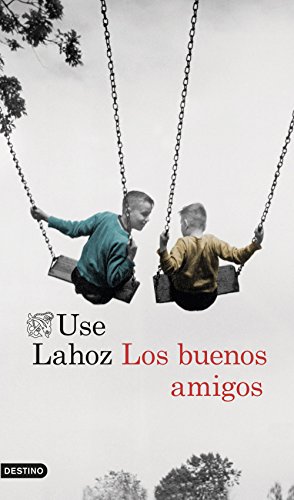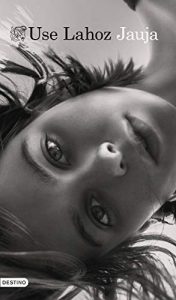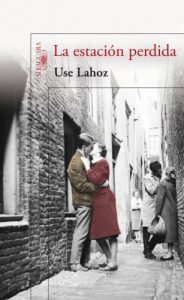In a literary presentation, the author on duty gave me his theory that if by the age of 40 you had not achieved a certain recognition of your work, it was better not to take it too seriously.
Use Lahoz he won the Primavera de Novela Prize with thirty-something. If we stick to the omens of that writer who knew about deadlines and processes, Use reached the goal of being a writer in a timely manner. Not as precocious as Espido freire but yes at that age still included in the label of young writer.
Only in the end it's not about that. Writing is not sealing paper ahead of deadlines. And Use Lahoz is a good example that being a writer is something else. Because in the end you always write taking it seriously, with all the artillery that you carry inside. Like so many other things undertaken from the strongest inner will.
The accolades, awards, and recognitions that Use has accumulated are not the goal but the consequence. And from his condition as a young author at the time, today he is already an essential narrator of our literature, outside of orders and deadlines.
Top 3 Recommended Use Lahoz Novels
The good friends
We have all lived those days when friendship achieves a meaning that it will seldom achieve during our lives. Childhood and its intense awakening to discovery, from the sincerity and open soul that makes you get along with others who move like you towards the light of the first horizons.
As an Aragonese, this novel had already earned me a bit, starting from the childhood of its protagonist in my own lands. Everything else, the later fascination came supervened. Impressions that permeate from the hard post-war years, even more so for a boy like Sixto who fills his misfortune with his orphanhood, thus intensifying the extreme value of friendship in childhood, from the circumstances that surround the plot. Adversity is a trompe l'oeil for childhood, a set to throw away thanks to imagination, picaresque and friendship.
Later the novel advances towards that future written for the boys from their particular circumstances. As we can suspect, the plot moves towards the melancholic idea that one never again bathes in the same river, nor should one return to the places where one was happy. Because neither rivers nor spaces exist as such. Sixto and Vicente were those playmates and adversity, capable in their union of overcoming setbacks inappropriate for their age. But when the days go by and they take care to bury what they lived, the dreamlike sensation of their particular childhood may turn into a nightmare. Decades later, the reunion drawn from the singular future of Spain, points to the dramatic sensation of a story in which anything can happen.
Jauja
Strictly literary, this novel is probably the best written so far by the author. Mastery of the trade, absolute control of resources, all as a perfect complement to an essential and inexhaustible argument in the author: life.
Because writing about life is adventure and truth. Exposing protagonists in whom we can inhabit with chilling realism, such as María, is more than just literary enjoyment. The construction of what we have to know about María comes to us from herself but also from the notion of her father, just out of the same scene in which she plays Chekhov's Luiba.
What the father who is no longer here tells us and what the actress who remains between the waters of her vital interpretation and that of her character is capable of transmitting to us, supposes a whole trip to the theater of the world, to humanism made stage art where everyone We interpret what we think we are. His father is dead. Surely while she inhabited a tear from Luiba. And at that moment it is his turn to review his script and consider whether he feels capable of going back to the beginning of his work, between childhood improvisations and feelings of hidden secrets.
We move into a single performance by Chekhov but we also go back to the complete life of Maria. We see the actress at the very moment in which we can discover everything that led her to that place. The loss of the father is a dramatic vital moment in which one does not know whether to declaim a soliloquy, whether to hold life to account, or to be carried away by suffocating nostalgia for distant memories and scenes already performed.
The lost station
At heart, Use Lahoz is also a narrator of historical fiction. Only their arguments are so deep that one ends up forgetting the scenery. In this novel, perhaps because of having a more classical point of argument, that intention to chronicle other days is observed (and enjoyed) more, that rescue of images from a past that is easily awakened thanks to old sepia photos An unexpected news will upset the life of Santiago Lansac.
From his small town, he will be forced to make his way first in the capital, and then in Barcelona and wherever fate wants to take him, on a journey full of adventures in which he will come across people whose intentions he will not know how to detect in time. Faced with so much misfortune, only love can save him.
The lost station It is a story of losers, but above all a human comedy with unforgettable characters: Santiago, an endearing madman, tormented by fear and the birds in his head, and Candela, the image of naivety, strength and unconditional love in a A time when women were educated to serve.
Without renouncing humor, with an agile and precise prose, and a mastery that strengthens it as narrative, Use Lahoz recounts the changes that Spain underwent in the second half of the XNUMXth century through these antiheroes, forced to emigrate and launched into unknown in a novel full of feelings.
Other recommended books by Use Lahoz
loose verse
Nothing more profoundly human than loose verse. Only those who display their discordant lyricism from their youth can end up being the necessary disruptive elements in society, creative people, critics capable of transformation. Except that sometimes the condition to be loose verse, and thus escape the hackneyed sonnet of existence, is given in a forced way. Thus exposing the discordant with his strange, alienated and different condition in front of the battalion of the insulting mediocrity.
Before turning fifteen, Sandra Martos discovers her sexual inclination and attends the separation of her parents; two circumstances that will make her feel at a disadvantage with the world that surrounds her until she meets Isa, a girl older than her, who will open the doors of her life for her.
From that moment on, he will be at permanent war with his origins and will seek answers and shelter outside of the family, in friendship, as well as in the movies and in books, the only places where desolation and heartbreak can be beautiful. Unaware of the transience of time, she will launch herself to live convinced that her nonconformity will not subside, of the magnetic power of friendship and of some loves and of the durability of feelings, without knowing that a friend can be the water but also the desert. .




